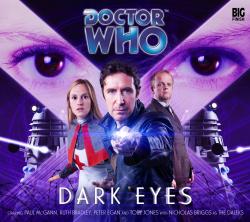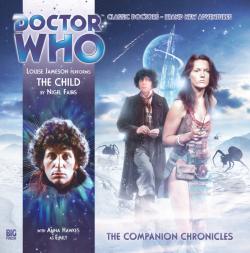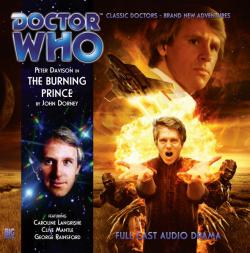Dark Eyes (Big Finish)
Sunday, 20 January 2013 - Reviewed by
This review is based on the MP3 download from Big Finish, and contains spoilers.
First, a confession. I’ve never been a regular follower of any of Big Finish’s Doctor Who series, purchasing rarely and selectively over the years, so much of what I have gathered about their additions to and refinements of Doctor Who mythology has been gleaned secondhand. However – metaphorically – they have a well-stocked larder of Doctor Who ingredients and can call on the services of confectioners of the highest skill. Here, the writer-director is Nicholas Briggs, who has reportedly been known to marshal his cast in character as a Dalek and so could surely be the focus of some bizarre reality TV series.
Returning to the kitchen, Doctor Who is like chocolate in that it is served in a wide variety of forms and has its addicts and connoisseurs. Dark Eyes is presented as the sort of event story which sets out to appeal to both. Its four instalments – The Great War, Fugitives, Tangled Web and X and the Daleks – provide several hours’ worth of concentrated essence of Doctor Who, more than enough to quieten the withdrawal symptoms of the fan desperate for a new hit, but it’s the substance and texture which are the proof of this pudding. Dark Eyes is constructed from layers of Doctor Who sponge, fudge cake, cream, ganache and mousse, but it’s the craft and the proportions which count, and some of the best chocolate recipes depend on the juxtaposition of the dark and light, the bitter and the sweet.
Dark Eyes is both a literal reference to a remarkable physical characteristic of the story’s heroine, Molly O’Sullivan, and a comment on the gloom which pervades the eighth Doctor’s universe. Lucie Miller is dead, Susan betrayed, the ascendancy of the Daleks seemingly inevitable. Seeking a vantage point at the end of time from which he can look back on the universe in the hope of ‘a wonderful view’, the Doctor is tempted away from this act of finality by the promise of hope elsewhere. The Western Front in the middle of the Great War is not necessarily an unpromising place to start looking for universal redemption, and the first instalment of the story is full of great kindnesses partially masked by circumstance.
In his short time on screen, the eighth Doctor was contextualised by a heady cocoa of religious imagery, and this is reinforced here. Within a few minutes the Doctor is gassed and buried and ‘resurrected’, only to be thrust back into a series of personal hells. Somewhere along the way he presumably gains the new costume which adorns the cover illustration of Later, he and Molly go for a perspective-shifting dip in the English Channel, and she takes to referring to his home planet as ‘Galilee’. For the Doctor, though, Gallifrey is not just the place he came from, but the heaven with all the answers to which he is not allowed, in this story, to ascend. The fragmented and state of the Doctor’s mind at the start of the story is conveyed through disorienting sound design and the tones of a Paul McGann who knows how his reading of the Doctor as a forsaken immortal tortured by existence can guide the listener through a convoluted and non-linear plot.
Ruth Bradley gives Molly a rich, dark, peaty voice, capable of expressing extremes of love and defensive cynicism. Molly is an Irishwoman in domestic service in London, effectively adopted as a sister by her mistress Kitty, whom she has joined in France as a member of the Voluntary Aid Detachment of nursing auxiliaries. She is naturally well-suited to travelling with the Doctor: she is broadminded, adaptable, capable of command and not overawed by TARDIS-travelling, albeit for reasons both good and sinister. There’s a playfulness too, even a flirtatiousness, though there are also flashes of old-fashioned companion dependency which sit ill at ease with the rest of her character.
Doctor Who Magazine compared Dark Eyes to The War Games, to which it bears some similarities of setting, structure and iconography. Most of the first episode, The Great War, is set on the Western Front, where the question of whether the Doctor is a spy is raised, strange and threatening mist falls, and there is evidence of non-terrestrial intervention in events. However, the differences are perhaps more striking. At the start of The War Games the Doctor fell among the (junior) officer class, finding allies in a lieutenant and the ambulance-driving daughter of a peer of the realm. Here there are no officers, and privates and VADs are oppressed by a status-conscious matron and a doctor who hides his hostile agenda behind an American accent.
Fittingly for an incarnation of the Doctor whose experiences seem to express his inner torment, the Doctor is dogged in this story by characters who are his mirrors. Peter Egan’s urbane Straxus may be supercilious and condescending, but his ability to step outside the well-worn conventions of Time Lord thinking is an asset and he is, despite himself, quite at home conversing with the arch-yokel goatherd (a descendant of Pigbin Josh, The League of Gentlemen’s Papa Lazarou, and Babylon 5’s Zathras) who adds an appreciated bizarre note to a couple of the early Srangor scenes. Toby Jones lends believability to the somewhat inept Kotris, an ex-Time Lord crippled by self-loathing psychosis. If this didn’t remind the listener of recent interpretations of another character somewhat central to Doctor Who, the Doctor’s denunciation of Kotris’s belief in the wrongs done by the Time Lords must intentionally recall one of the most well-remembered speeches in The Trial of a Time Lord.
There’s often been an element of comfort food in Big Finish releases, and even amid the 70% cocoa questioning of the Doctor’s moral purpose, there is the chocolate cream of retroengineered continuity and allusions to the past and future of the television series. Ian Cullen’s Nadeyan enunciates names rather like his Ixta did nearly fifty years ago in The Aztecs. There are characters in The Great War whose names seem to be borrowed from early production personnel. There are time winds and of course medical personnel to be baffled by double heartbeats. As suits a story by Dalek scholar Nicholas Briggs, there are lots of homages to the work of Terry Nation in both theme and incident.
Against this Dark Eyes is animated by a relentless pressure to move on. It’s expressed in the different settings, realised in the Doctor’s search for meaning; in a breathtaking diversion which teases the listener with the prospect of the Daleks building a flower-garlanded variant of Prince Charles’s Poundbury; and the increasing complexity of the four-dimensional dance of death between Daleks and Time Lords. Andy Hardwick’s sound design deserves a large amount of credit, particularly in his imagining of the distinct sounds of different wars. There are references forward to what is from the point of view of Dark Eyes the Doctor’s future, too, tantalising as Big Finish inch closer to that bend in both licence and Doctor Who universe, the Time War.
Molly says that the Doctor reminds her of a victim of shellshock. Dark Eyes – as Straxus and the enigmatic Time Lord President seem to recognise – is not the best therapy for someone suffering from post-traumatic stress disorder. The scenario repeats several of the elements of the Doctor’s ill-fated relationship with Lucie Miller. The Daleks seem ubiquitous, undermining almost every small triumph the Doctor and Molly have. The way in which the schemes of Daleks and Time Lords are upset fits a story which concerns over-reliance on the analyses of processes psychological, managerial and temporal, and blindness to the fates of individuals. The nature of this kind of victory is the dusting of sugar on this particular gateau, counterbalancing some of the more bitter curls to make one wonder what flavour the eighth Doctor’s adventures will take next.
First, a confession. I’ve never been a regular follower of any of Big Finish’s Doctor Who series, purchasing rarely and selectively over the years, so much of what I have gathered about their additions to and refinements of Doctor Who mythology has been gleaned secondhand. However – metaphorically – they have a well-stocked larder of Doctor Who ingredients and can call on the services of confectioners of the highest skill. Here, the writer-director is Nicholas Briggs, who has reportedly been known to marshal his cast in character as a Dalek and so could surely be the focus of some bizarre reality TV series.
Returning to the kitchen, Doctor Who is like chocolate in that it is served in a wide variety of forms and has its addicts and connoisseurs. Dark Eyes is presented as the sort of event story which sets out to appeal to both. Its four instalments – The Great War, Fugitives, Tangled Web and X and the Daleks – provide several hours’ worth of concentrated essence of Doctor Who, more than enough to quieten the withdrawal symptoms of the fan desperate for a new hit, but it’s the substance and texture which are the proof of this pudding. Dark Eyes is constructed from layers of Doctor Who sponge, fudge cake, cream, ganache and mousse, but it’s the craft and the proportions which count, and some of the best chocolate recipes depend on the juxtaposition of the dark and light, the bitter and the sweet.
Dark Eyes is both a literal reference to a remarkable physical characteristic of the story’s heroine, Molly O’Sullivan, and a comment on the gloom which pervades the eighth Doctor’s universe. Lucie Miller is dead, Susan betrayed, the ascendancy of the Daleks seemingly inevitable. Seeking a vantage point at the end of time from which he can look back on the universe in the hope of ‘a wonderful view’, the Doctor is tempted away from this act of finality by the promise of hope elsewhere. The Western Front in the middle of the Great War is not necessarily an unpromising place to start looking for universal redemption, and the first instalment of the story is full of great kindnesses partially masked by circumstance.
In his short time on screen, the eighth Doctor was contextualised by a heady cocoa of religious imagery, and this is reinforced here. Within a few minutes the Doctor is gassed and buried and ‘resurrected’, only to be thrust back into a series of personal hells. Somewhere along the way he presumably gains the new costume which adorns the cover illustration of Later, he and Molly go for a perspective-shifting dip in the English Channel, and she takes to referring to his home planet as ‘Galilee’. For the Doctor, though, Gallifrey is not just the place he came from, but the heaven with all the answers to which he is not allowed, in this story, to ascend. The fragmented and state of the Doctor’s mind at the start of the story is conveyed through disorienting sound design and the tones of a Paul McGann who knows how his reading of the Doctor as a forsaken immortal tortured by existence can guide the listener through a convoluted and non-linear plot.
Ruth Bradley gives Molly a rich, dark, peaty voice, capable of expressing extremes of love and defensive cynicism. Molly is an Irishwoman in domestic service in London, effectively adopted as a sister by her mistress Kitty, whom she has joined in France as a member of the Voluntary Aid Detachment of nursing auxiliaries. She is naturally well-suited to travelling with the Doctor: she is broadminded, adaptable, capable of command and not overawed by TARDIS-travelling, albeit for reasons both good and sinister. There’s a playfulness too, even a flirtatiousness, though there are also flashes of old-fashioned companion dependency which sit ill at ease with the rest of her character.
Doctor Who Magazine compared Dark Eyes to The War Games, to which it bears some similarities of setting, structure and iconography. Most of the first episode, The Great War, is set on the Western Front, where the question of whether the Doctor is a spy is raised, strange and threatening mist falls, and there is evidence of non-terrestrial intervention in events. However, the differences are perhaps more striking. At the start of The War Games the Doctor fell among the (junior) officer class, finding allies in a lieutenant and the ambulance-driving daughter of a peer of the realm. Here there are no officers, and privates and VADs are oppressed by a status-conscious matron and a doctor who hides his hostile agenda behind an American accent.
Fittingly for an incarnation of the Doctor whose experiences seem to express his inner torment, the Doctor is dogged in this story by characters who are his mirrors. Peter Egan’s urbane Straxus may be supercilious and condescending, but his ability to step outside the well-worn conventions of Time Lord thinking is an asset and he is, despite himself, quite at home conversing with the arch-yokel goatherd (a descendant of Pigbin Josh, The League of Gentlemen’s Papa Lazarou, and Babylon 5’s Zathras) who adds an appreciated bizarre note to a couple of the early Srangor scenes. Toby Jones lends believability to the somewhat inept Kotris, an ex-Time Lord crippled by self-loathing psychosis. If this didn’t remind the listener of recent interpretations of another character somewhat central to Doctor Who, the Doctor’s denunciation of Kotris’s belief in the wrongs done by the Time Lords must intentionally recall one of the most well-remembered speeches in The Trial of a Time Lord.
There’s often been an element of comfort food in Big Finish releases, and even amid the 70% cocoa questioning of the Doctor’s moral purpose, there is the chocolate cream of retroengineered continuity and allusions to the past and future of the television series. Ian Cullen’s Nadeyan enunciates names rather like his Ixta did nearly fifty years ago in The Aztecs. There are characters in The Great War whose names seem to be borrowed from early production personnel. There are time winds and of course medical personnel to be baffled by double heartbeats. As suits a story by Dalek scholar Nicholas Briggs, there are lots of homages to the work of Terry Nation in both theme and incident.
Against this Dark Eyes is animated by a relentless pressure to move on. It’s expressed in the different settings, realised in the Doctor’s search for meaning; in a breathtaking diversion which teases the listener with the prospect of the Daleks building a flower-garlanded variant of Prince Charles’s Poundbury; and the increasing complexity of the four-dimensional dance of death between Daleks and Time Lords. Andy Hardwick’s sound design deserves a large amount of credit, particularly in his imagining of the distinct sounds of different wars. There are references forward to what is from the point of view of Dark Eyes the Doctor’s future, too, tantalising as Big Finish inch closer to that bend in both licence and Doctor Who universe, the Time War.
Molly says that the Doctor reminds her of a victim of shellshock. Dark Eyes – as Straxus and the enigmatic Time Lord President seem to recognise – is not the best therapy for someone suffering from post-traumatic stress disorder. The scenario repeats several of the elements of the Doctor’s ill-fated relationship with Lucie Miller. The Daleks seem ubiquitous, undermining almost every small triumph the Doctor and Molly have. The way in which the schemes of Daleks and Time Lords are upset fits a story which concerns over-reliance on the analyses of processes psychological, managerial and temporal, and blindness to the fates of individuals. The nature of this kind of victory is the dusting of sugar on this particular gateau, counterbalancing some of the more bitter curls to make one wonder what flavour the eighth Doctor’s adventures will take next.













